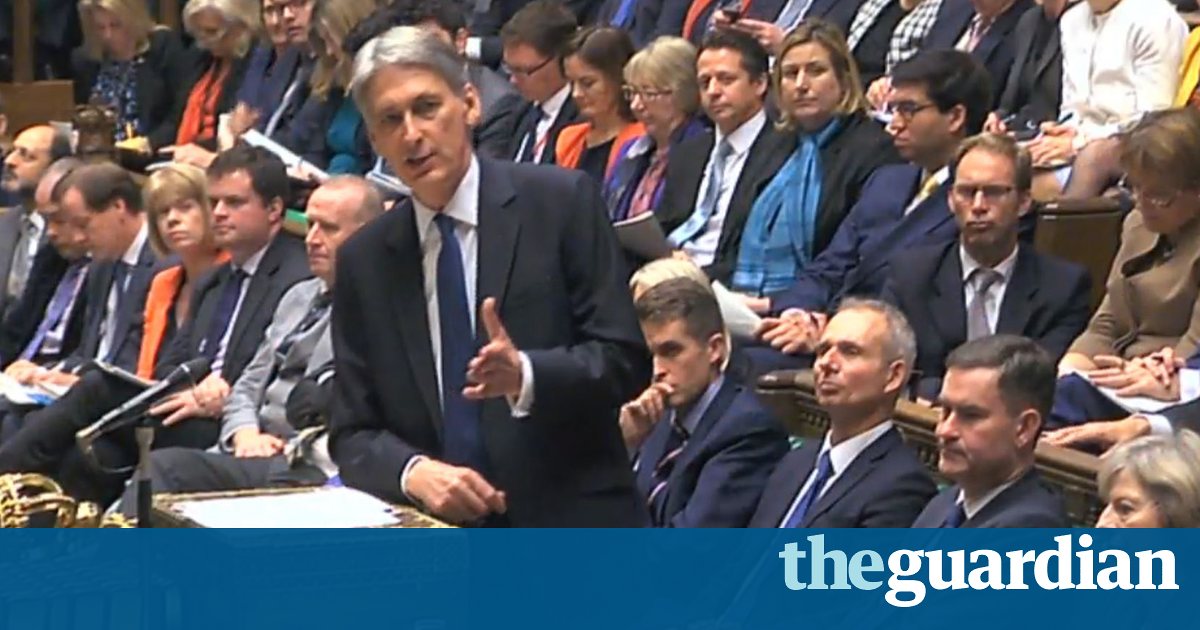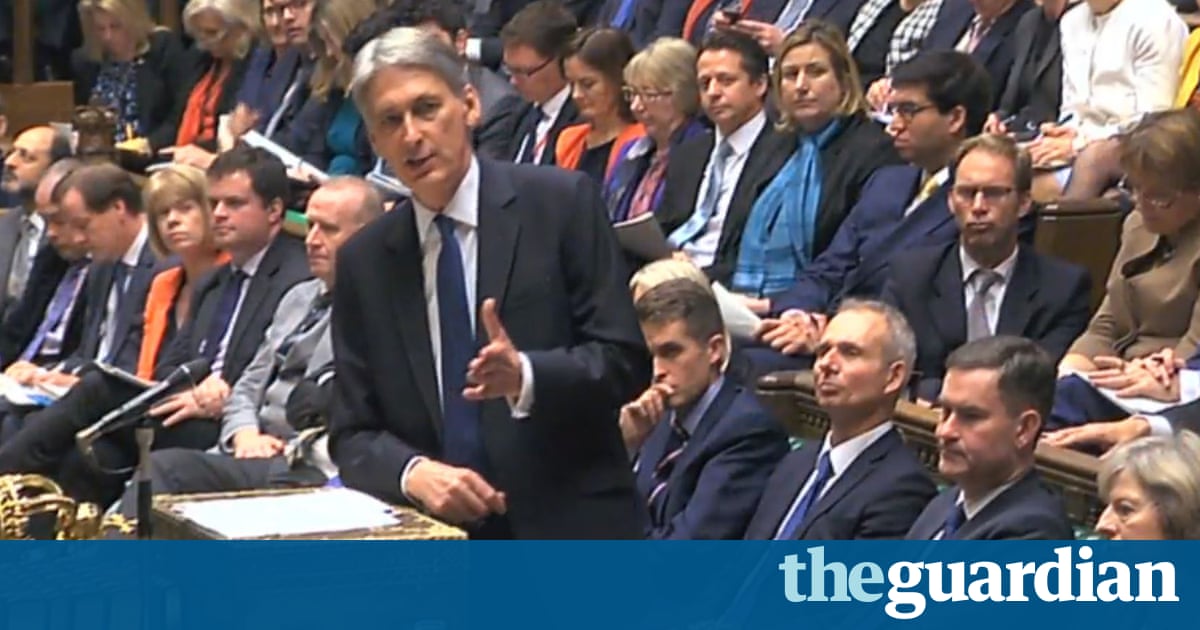Brexit will blow 59bn hole in public finances, admits Hammond

Chancellor attempts to strike cautiously upbeat tone but OBR warns of extra borrowing over next five years.

Philip Hammond conceded that Brexit will blow a 59bn black hole in the public finances over the next five years, as he outlined plans to boost investment in infrastructure and housing to equip the UK economy for life outside the European Union.
In his first fiscal statement, the chancellor, who had supported remain, sought to strike a cautiously upbeat tone about the country’s prospects, saying the economy had confounded commentators at home and abroad with its strength and its resilience since the referendum result last June.
But the first official projections conducted after the vote of the likely impact of leaving the EU pointed to significantly weaker growth after Brexit. The Office for Budget Responsibility said there would be a cumulative 59bn of extra borrowing over the next five years, as a direct result of the decision.
With the Treasury now expecting the public finances to be deep in the red until the next parliament, Hammond offered only modest handouts to the just about managing families (Jams) Theresa May’s government had said it wants to help, although he repeatedly used the mantra of building an economy that works for everyone.
The chancellor announced a renewed freeze in fuel duty, to help motorists – largely paid for with an increase in insurance premium tax from 10% to 12% – and a partial reversal of planned cuts to universal credit.
But Labour said there was no cash for either the NHS or social care, which are under increasing strain with winter approaching. Instead, the main thrust of Hammond’s first set-piece outing at the dispatch box was how to help Britain withstand the challenges of leaving the EU.
Instead of a headline-grabbing gimmick, Hammond ended his speech with the surprise announcement that he had delivered the final autumn statement. In future, budgets will be held annually in the autumn, with a more slimmed-down update in the spring, meaning that there would be two budgets in 2017.
Hammond told the Commons that the Brexit vote makes more urgent than ever the need to tackle our economy’s long-term weaknesses, like the productivity gap, the housing challenge, and the damaging imbalance in economic growth and prosperity across our country.
The chancellor added: in the real world, it takes a German worker four days to produce what we make in five; which means, in turn, that too many British workers work longer hours for lower pay than their counterparts.
Hammond said he would set aside 23bn over the next five years, to be spent on areas such as new housing projects and hi-tech research, funded by extra borrowing. A Treasury spokesman, lifting a phrase more commonly used by Labour, said, he is borrowing to invest.
Labour pointed out that other policies, including a ban on letting agents fees, were taken from its 2015 manifesto, as Theresa May’s government deliberately takes a more interventionist approach to what it regards as failing markets.
Hammond also promised to take another look at the household energy market, where consumer groups have repeatedly warned customers are being ripped off.
In a sign that the government expects the public finances to continue to be fragile, the chancellor also hinted that costly pledges including the triple lock on pensions, would have to be reviewed before the Conservatives draw up their manifesto for the next general election.
“As we look ahead to the next parliament, we will need to ensure we tackle the challenges of rising longevity and fiscal sustainability,” Hammond said. “And so the government will review public spending priorities and other commitments for the next parliament in light of the evolving fiscal position at the next spending review.”
Peter Dixon, UK economist at Commerzbank, said: “The government remains hamstrung by its desire to further reduce the fiscal deficit at the same time as Brexit-related uncertainty is likely to rise. For this reason, it will prove difficult to help the Jams who suffered under George Osborne’s tenure as chancellor.”
The OBR warned that Brexit would lead to weaker growth and lower tax receipts, because of higher inflation, slower immigration, and a decade-long slowdown in trade growth. It has assumed that the negotiation of new trading arrangements with the EU and others slows the pace of import and export growth for the next 10 years.
In total, the OBR said it expected the chancellor to have to borrow an extra 122bn over the next five years with almost half of that, 59bn, attributable to the impact of Brexit. Austerity is now expected to continue into the next parliament: more than a decade after Osborne promised to tackle the deficit run up during the financial crisis.
The OBR said it had been forced to base its forecasts on broad-brush judgments about the likely path of Brexit, because of the lack of clarity from the government. It asked for a formal statement of government policy as regards its desired trade regime and system of migration control, but the government directed it to public statements from Theresa May, who has repeatedly refused to give a running commentary on Brexit.
OBR projections also showed economic growth sliding to 1.4% in 2017, from the 2.2% the OBR was expecting in March, before recovering to 2.1% by 2020. But the OBR warned that there was more uncertainty than usual surrounding its forecasts and some commentators suggested there could be worse to come.
With the public finances expected to deteriorate, Hammond could have made emergency spending cuts; but instead he formally abandoned George Osborne’s target of dragging the public finances back into the black by the end of this parliament in 2019-20, and introduced new, looser tax and spending rules.
Under the new framework, the budget deficit is now not expected to be eliminated until some time in the next parliament. In the autumn statement green book, the Treasury said its approach strikes the right balance between restoring the public finances to health in the medium term whilst providing sufficient flexibility to support the economy in the near term.
Treasury sources said this approach would leave him room for manoeuvre to take emergency measures, if the economy weakens more sharply than expected, as article 50 is triggered next year.
In the House of Commons, Hammond’s predecessor Osborne, who rose from the back benches to congratulate him on his assured delivery, said: “The independent OBR has given us a very sober assessment of the economic and borrowing challenges that Britain faces and the chancellor is right to keep his powder dry.”
While Hammond unravelled some of Osborne’s policies, including his strict tax and spending rules, he reaffirmed several of his predecessor’s key pledges, including raising the tax-free personal allowance to 12,500 a year by the end of this parliament, and cutting corporation tax to 17%. Most of the welfare cuts Osborne planned, including a cash freeze in working-age benefits, and a 30 a week cut in employment support allowance for disabled people, will go ahead.
Labour MPs repeatedly challenged Hammond about the price of Brexit. Former Labour leader Ed Miliband said the new forecasts were a salutary warning to us about the decisions we take in the coming months, adding, “Isn’t it a very strong argument for us to remain as close as possible to our largest trading area the single market and inside not outside the customs union?”
Shadow chancellor John McDonnell said, “Today’s statement places on record the abject failure of the last six wasted years and offers no hope for the future. The figures speak for themselves: growth, down; business investment, down; and their own deficit target, failed; their debt target, failed.”
Andrew Harrop, general secretary of the Fabian Society, said: “This wasn’t a Brexit budget, it was a Brexit uncertainty budget. Almost all the dire economic and fiscal news that was revealed today was the result, not of Brexit itself, but of the referendum decision and the pending article 50 negotiation. This could be just the start.”